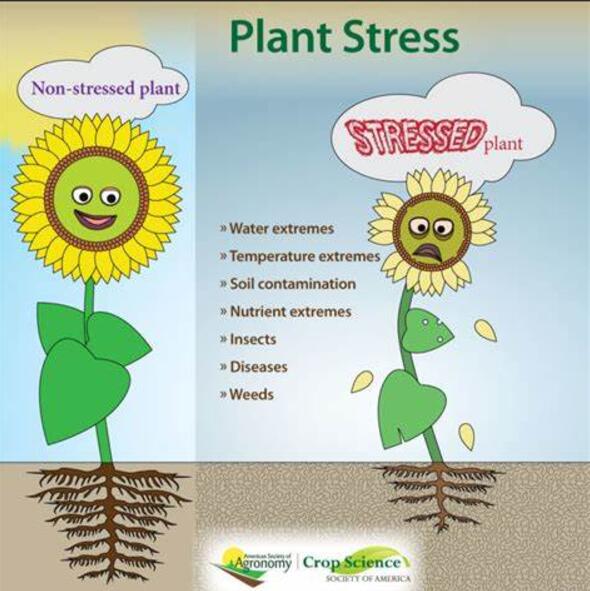水稻蔗糖不发酵相关蛋白激酶(SnRK1)在防御秋绵虫(Spodoptera frugiperda)方面的作用有限
IF 6.8
Q1 PLANT SCIENCES
引用次数: 0
摘要
蔗糖不发酵(SNF)相关蛋白激酶1(SnRK1)是能量剥夺信号的主调节因子,也与非生物和生物应激调节有关。SnRK1 通过新陈代谢和转录变化促进应激耐受性,并在对抗各种病原体的先天免疫中发挥重要作用。然而,它是否在对抗昆虫草食性方面发挥作用还不清楚。为了验证这一点,我们利用水稻野生型(含有 SnRK1)和 snrk1 突变株系,研究了 SnRK1 在水稻对抗毁灭性害虫--Fall armyworm(FAW)--Spodoptera frugiperda 的潜在作用。我们还研究了在外源施用植物激素茉莉酸(JA)和 JA 阻断剂(布洛芬)后的不同时间间隔内,FAW 对这些品系的反应。此外,还进行了其他实验,如用灌叶饲料、鲜叶喂养小袋鼠,以及让小袋鼠短期接触这些品系。我们观察了FAW的增重、生长发育和寄主生态生理特征。此外,我们还对食草前后的主要表面防御功能--毛状体和蜡进行了量化。结果表明,突变体和野生型水稻对FAW的反应没有差异。同时,我们发现植物激素的应用对生态生理特性的影响不分突变体和野生型水稻。总之,我们通过对野生型和 snrk1 突变株系的操作实验发现,虽然水稻对 FAW 的防御是由 JA 介导的,但 SnRK1 的作用有限。本文章由计算机程序翻译,如有差异,请以英文原文为准。
Rice sucrose non-fermenting related protein kinase (SnRK1) has a limited role in defense against Fall armyworm (Spodoptera frugiperda)
Sucrose non-fermenting (SNF) related protein kinase 1 (SnRK1) is a master regulator of energy deprivation signaling, has also been implicated in abiotic and biotic stress regulation. SnRK1 promotes stress tolerance through metabolic and transcriptional changes and plays important roles in innate immunity against various pathogens. However, whether it plays a role against insect herbivory is not understood. To test this, using the wild type (with SnRK1) and snrk1 mutant lines in rice, we examined the potential role of SnRK1 in rice against the ruinous pest, Fall armyworm (FAW), Spodoptera frugiperda. We also investigated the response of FAW towards these lines at different time intervals after exogenous application of plant hormone, Jasmonic acid (JA), and a JA blocker (Ibuprofen). Additional experiments by feeding FAW with leaf infused diet, fresh leaves, and a short-term exposure of FAW to the lines were also carried out. FAW mass gain, growth and development, and host ecophysiological traits were observed. In addition, we also quantified the major surface defenses- trichomes, and wax before and after herbivory. Our results show that FAW response did not vary between mutants and wild type rice. Meanwhile, we found plant hormonal application influenced the ecophysiological traits regardless of mutants and wild type rice. Collectively, we show that while defense against FAW in rice is JA mediated, SnRK1 has a limited role as observed through manipulative experiments with the wild type and snrk1 mutant rice lines.
求助全文
通过发布文献求助,成功后即可免费获取论文全文。
去求助
来源期刊

Plant Stress
PLANT SCIENCES-
CiteScore
5.20
自引率
8.00%
发文量
76
审稿时长
63 days
期刊介绍:
The journal Plant Stress deals with plant (or other photoautotrophs, such as algae, cyanobacteria and lichens) responses to abiotic and biotic stress factors that can result in limited growth and productivity. Such responses can be analyzed and described at a physiological, biochemical and molecular level. Experimental approaches/technologies aiming to improve growth and productivity with a potential for downstream validation under stress conditions will also be considered. Both fundamental and applied research manuscripts are welcome, provided that clear mechanistic hypotheses are made and descriptive approaches are avoided. In addition, high-quality review articles will also be considered, provided they follow a critical approach and stimulate thought for future research avenues.
Plant Stress welcomes high-quality manuscripts related (but not limited) to interactions between plants and:
Lack of water (drought) and excess (flooding),
Salinity stress,
Elevated temperature and/or low temperature (chilling and freezing),
Hypoxia and/or anoxia,
Mineral nutrient excess and/or deficiency,
Heavy metals and/or metalloids,
Plant priming (chemical, biological, physiological, nanomaterial, biostimulant) approaches for improved stress protection,
Viral, phytoplasma, bacterial and fungal plant-pathogen interactions.
The journal welcomes basic and applied research articles, as well as review articles and short communications. All submitted manuscripts will be subject to a thorough peer-reviewing process.
 求助内容:
求助内容: 应助结果提醒方式:
应助结果提醒方式:


